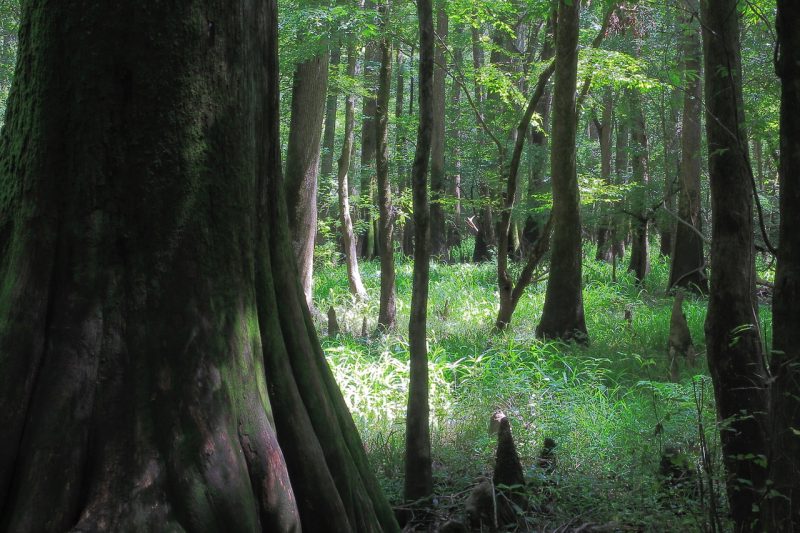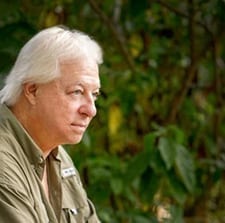Chasing The Ivorybill
August 2, 2023By Tom Poland
“Chasing the Swamp Ghost” caught my eye, and I read Garden & Gun’s feature about photographer Bobby Harrison’s quest to capture irrefutable evidence that the ivorybill woodpecker still lives. As I read, I came across a vague reference to the ivorybill’s connection with the creation of Congaree Swamp. My interest doubled—just what was that connection?
Sooner than later, the U.S. Fish & Wildlife Service may decide whether to declare the ivorybill extinct. If it declares it extinct, the stroke of a pen will end protection for the species, a creature that generates controversy. In the June-July 2023 issue of Garden & Gun, Lindsey Liles writes that the ivorybill “has sparked a heated, century-long debate; captured imaginations; marred reputations; influenced the creation of Congaree National Park; and sparked infighting in the scientific community between those who demand hard proof and those who say the ivorybill has persisted against all odds, transformed by natural selection into a creature so quiet, so wary, and so elusive that producing a crisp photo or video of one is as difficult as spotting the bird in the first place.”

In other words if you claim you see an ivorybill you risk being labeled a kook. And so my hat’s off to Bobby Harrison and I hope he photographs and videos the swamp ghost, proving it’s still with us. For now, the bird’s status is critically endangered.
Now, what’s this business about the ivorybill influencing the creation of Congaree National Park? It goes back to spring 1971. Loggers were eyeing the swamp and its timber. Details vary but the story goes that now-retired Chief Justice of the S.C. Court of Appeals Alex Sanders and a group he described as “South Carolina’s infant environmental movement” wanted the government to protect the last untouched old growth bottomland hardwood forest. In a boat going down the Congaree River, Sanders and others, along with television reporters, played a recording of the woodpecker. Sanders said everyone left the boat convinced that they had heard a reply. Nonetheless, further surveys of the swamp failed to reveal any signs of the bird.
Did an ivorybill really respond to the recording?
“It doesn’t really matter whether it’s true or not,” said Sanders. “He was there when we needed him to be.” Sanders’ report, I read, corroborated by those with him, drew international attention and compelled the U.S. government to establish Congaree National Park. While that helped I’m sure, I prefer to give credit where credit is due. Years earlier, in the 1950s, a visionary newspaper editor and outdoorsman, Harry Hampton, waged a one-man campaign to protect Congaree Swamp. For a while his efforts failed to bear fruit. In 1969, however, rising timber prices made logging the swamp profitable. A grass-roots campaign championing Hampton’s work took hold, and Congaree Swamp earned a National Natural Landmark designation. In 1976 it received protection as the Congaree Swamp National Monument. In 1983 it was designated an International Biosphere Reserve, in 2002, a Globally Important Bird Area, and in 2003 a national park.
Were these achievements all because an audio recording imitated a wild bird’s call? The publicity had to help, but Harry Hampton’s work carried the load. All his efforts paid off and continue to pay off. The Harry Hampton Wildlife Fund helps make scholarships, certain DNR law enforcement programs, and projects like the ACE Basin, teacher grants, marine education programs, and more possible.
Considering Hampton’s efforts to preserve Congaree Swamp the ivorybill could have benefitted from an army of Hamptons. In the words of James Kilgo, a man who wrote about nature, the landscape, and our connection to them, Congaree National Park was “deep enough for ivorybills.” No doubt, the ivorybill’s call once resounded throughout its great trees and waters. Did Harry Hampton hear the nasal, tin-trumpet call of the swamp ghost, what some call the “Lord God” bird? I like to think he did, and I like what Bobby Harrison has to say about the Ivorybill.
“The ivorybill itself isn’t likely to notice that the government declared it extinct. As long as I’m able, I’ll be out here searching.” Harrison’s dogged determination remains unshaken. That sounds a lot like something Harry Hampton would have said and done. Harrison and Hampton, they’d have made a formidable team.
Georgia native Tom Poland writes a weekly column about the South, its people, traditions, lifestyle, and culture and speaks frequently to groups in the South. Governor Henry McMaster conferred the Order of the Palmetto upon Tom, South Carolina’s highest civilian honor, stating, “His work is exceptional to the state.” Poland’s work appears in books, magazines, journals, and newspapers throughout the South.
Visit Tom’s website at www.tompoland.net
Email him at [email protected]















